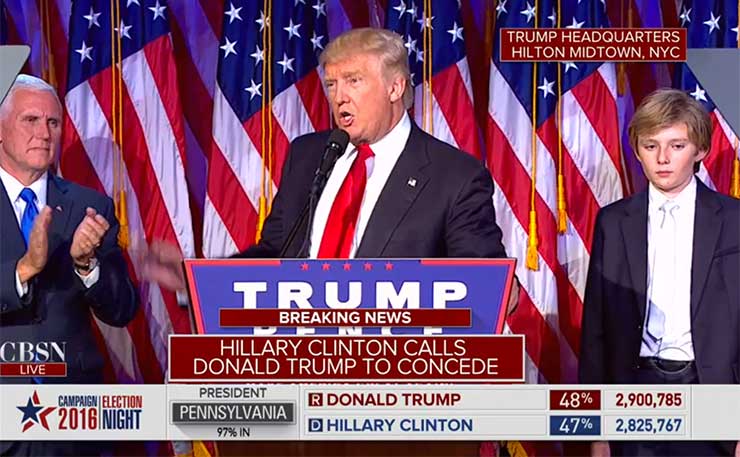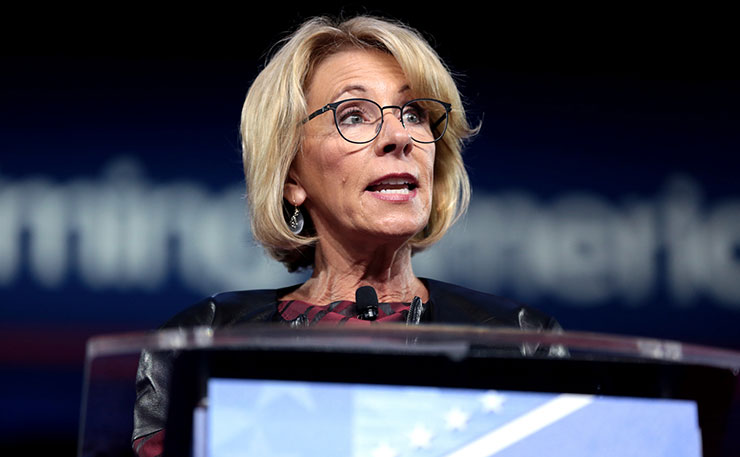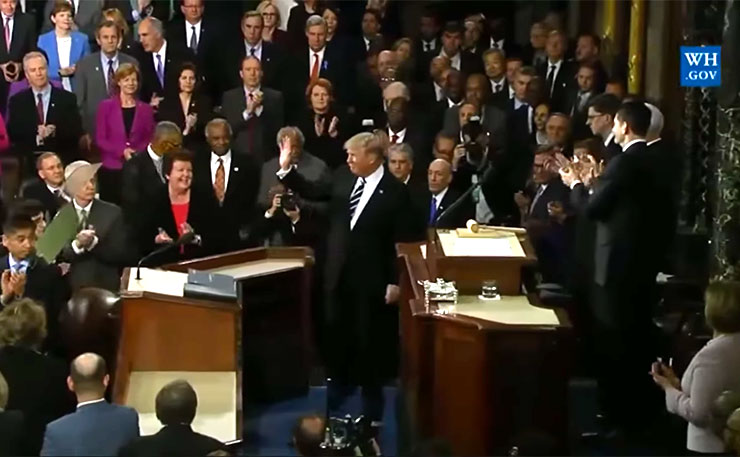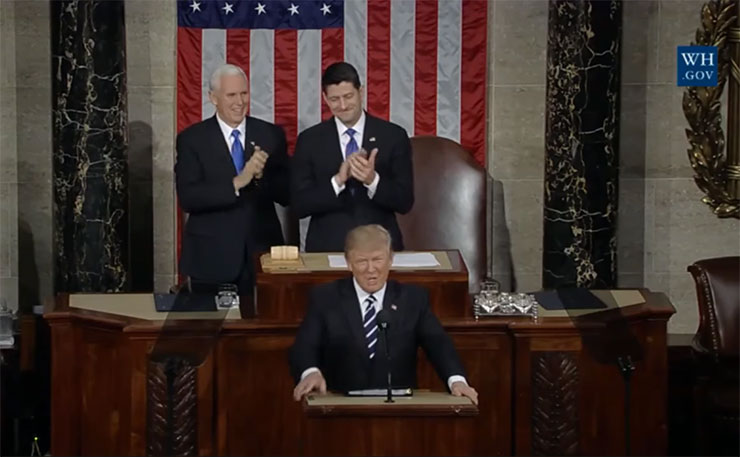Sooner or later, he had to have a victory. And that’s what makes Donald Trump’s presidency even more terrifying, writes Stephen Scher.
Donald Trump’s speech to the joint session of Congress was, it is widely agreed, an unexpected success. Setting aside, at least for sixty minutes, his bellicosity, arrogance, and insensitivity, he was generally upbeat and looking to the future, not the past, as he presented his views on America, its problems, and its challenges. He even recognized the need for compromise, for working together.
The Democratic members of Congress, as expected, were visibly unimpressed but could also be seen grumbling among themselves. By contrast, the Republicans could be observed as being not just enthusiastic but, one might say, even gleeful.
It looked to be, perhaps, a new Donald Trump, one prepared, as he said, to leave “small thinking” and “trivial fights” behind, and to chase the “dreams that fill our hearts”.
It’s fair to say that one speech does not change a man — despite his soft words, Trump is Trump — but it also needs to be recognised that a single speech can change the dynamic of an entire political class, the entire nation. Which is exactly what may have happened here.
Trump has long been seen as dangerous. His relentless attacks on the press threaten the very core of the democratic political process. His refusal to commit himself, in advance, to accepting the results of the November presidential election put at risk the organized, peaceful transition of political power from one administration to the next. His repeated assertions — even after his election — that millions of people voted illegally not only were baseless, but undercut public confidence in free and fair elections.

Domestically, his broad attacks on the federal government during the campaign demonstrated both an ignorance of government and a determination to tear it down. His selection of political advisers and his appointments to the cabinet and other senior positions gave clear expression to that goal, with many such appointees explicitly opposed to the missions of their own departments or agencies.
Internationally, and in an effort to put America first (the rest of the world be damned), Trump has already seriously destabilized the otherwise stable, and stabilizing, geopolitical order that evolved following the end of World War II. Trump’s commitment to NATO, the WTO, and the North-American Free Trade Agreement (not to mention his withdrawal from the Trans-Pacific Partnership) are all, at best, problematic.
Trump has also demonstrated himself to be careless and ignorant about international affairs. Of note here are his continuing flirtation with Vladimir Putin, his amateurish and abrasive dealings with China, his seeming willingness to embrace nuclear options, and his de facto call for a new nuclear arms race (the inevitable consequence of demanding, as Trump did, that the United States establish nuclear superiority over Russia and China).
Finally, his interest in protecting the earth’s environment is, as far as anyone can determine, nil.
The working assumption has been that if the potential dangers associated with the Trump presidency are to be mitigated, the Republicans in Congress — who have majority control of both the Senate and the House of Representatives — would have to take on the role of opposing their own party’s president. It would take courage, of course, and potentially raise the ire of their constituents, but if the Republicans in Congress do nothing, the world as we’ve known it may well be coming to an end. There is no way of foreseeing where the inevitable destabilization would lead (other than to a much warmer planet).
The first test of courage, just after Trump took office, concerned the nomination of Betsy DeVos, a billionaire committed ideologically and financially to private “charter schools” and “school choice” (away from existing public schools), to become Secretary of Education.

At her confirmation hearing before the relevant Senate committee, she was grotesquely ignorant regarding public education, and she was then, and remains now, opposed to the public mission of the Department of Education. Nevertheless, when the full Senate was called upon to approve or reject her nomination, only 2 of 52 Republican Senators were willing to oppose it — one vote short of rejecting it — even though DeVos was likely the least qualified nominee to a presidential cabinet position since World War II, had no experience and no interest in public education, and presented no realistic expectation of meeting even the most minimal expectations for competent service as head of a federal department.
Her learning curve as the new Secretary of Education has proved to be nearly flat.
The DeVos situation shows just how hard it would be for the Republican Congress to stand up against Trump. Or better, one should say, how unwilling Republican members of Congress are to jeopardize their political positions — via the loss of support among their constituents — simply because their party’s president is acting like a willful, ignorant fascist and putting America, its established political institutions, and its people, not to mention the world political order and the earth itself, at risk.
But prior to Trump’s speech, for Republican members of Congress, the situation was one of inescapable conflict. To oppose Trump was to act contrary to their positions and standing as professional politicians whose primary task was to remain in office, election after election. For such politicians — which has come to be, these days, most politicians (at least in America) — good governance and the commonweal are, at best, secondary. But it is just such values that Republican members of Congress would have to act upon in order to hold Trump within bounds and potentially forestall the implosion of American democracy and the loss of America’s place in the world.
In the first weeks of the Trump presidency, the resulting conflict between the Republicans’ self-interest and public need was palpable. How to serve both self and the nation had no obvious solution. And yet, it seems, the Republicans would need to act, publicly defying the president, at some point, and potentially sooner rather than later.
But here is where Trump’s speech to Congress comes in.

One would have to assume that for many Republicans who were not Trump enthusiasts, the president’s speech to Congress brought him back, or at least gave him the appearance of being back, within the Republican mainstream. And the implication for Republican members of Congress is profound: they can now set themselves to follow the lead of a mainstream president, come what may. The decisions and goals are those of the president, which the Republicans in Congress can now simply say they are adopting as their own. It’s a simple matter of party loyalty and respect for the office of the president.
Hence the Republicans’ glee as they heard Trump’s speech. He was basically letting them off the hook. They can now see themselves as (professional) politicians who experience no conflict in following Trump and what can now be considered his mainstream policies and goals. A certain amount of self-deception may be involved, but the psychologically winning position for Republicans in Congress is to gloss Trump’s actions as falling within the political mainstream. No further thought required. Just as long as this gloss can be maintained, it’s literally a matter of following the leader.
Another way of understanding the change is that for Republican members of Congress, the pre-speech problem — fraught with consequences for their professional lives — was to decide at what point they would challenge and potentially oppose the actions of a freewheeling, willful, self-regarding, and self-indulgent president who was, whether intentionally or not, moving the country away from democracy and toward fascism.
The post-speech situation was radically different. Opposition no longer needed to be contemplated. Whatever Trump’s personal faults and idiosyncrasies, he had created the appearance of having views within the political mainstream. And loyal party members simply follow their president.
In addition to making it easier for Republicans to follow the president’s lead, Trump’s speech to Congress makes it harder for Republicans to challenge him. Insofar as Trump can maintain the appearance of acting within the political mainstream, challenging his actions would put a Republican at risk of being perceived, by fellow members of Congress and also by constituents, as an undisciplined maverick either pursuing his or her own goals or incapable of maintaining party unity, to the detriment of the party. For professional politicians, the potential cost of such challenges is therefore considerable. Don’t hold your breath.

Note that none of the above depends upon Trump having mainstream political views. He doesn’t, and to the extent that his actual views are translated into actions, America will be moving away from its democratic roots and its traditions as an open society that thrives on intellectual, cultural, and political diversity at home, and that sees itself as a major contributor to the global community and to world peace.
Indeed, it is indeterminate what America and the rest of the world will look like by the end of Trump’s presidency, whether in four years or eight. What confidence will the American people have in the nation’s political institutions? What will be the legacy of his followers’ anti-democratic, anti-intellectual, anti-federal nonsense? Will America have the resilience to recover?
No-one knows. But what one does know is that Trump’s speech has potentially changed the game. It has made it all too easy for Republicans to fall in line behind the president. And it has made it all too hard for Republicans to dissent from the president’s policies and initiatives. Before the speech, Trump was dangerous. But now, he is even more dangerous. Much more dangerous.
As Betsy Davis said in All About Eve (accurately quoted), “Fasten your seatbelts. It’s going to be a bumpy night.”
Donate To New Matilda
New Matilda is a small, independent media outlet. We survive through reader contributions, and never losing a lawsuit. If you got something from this article, giving something back helps us to continue speaking truth to power. Every little bit counts.






